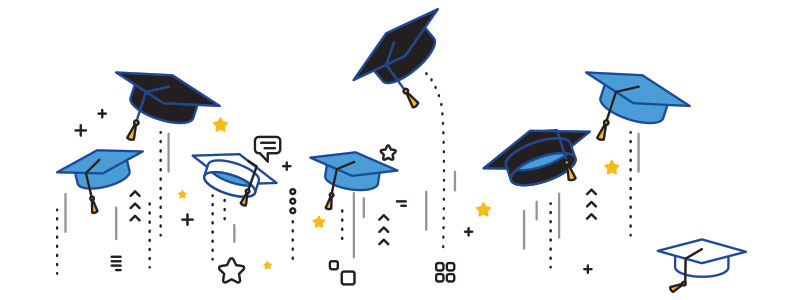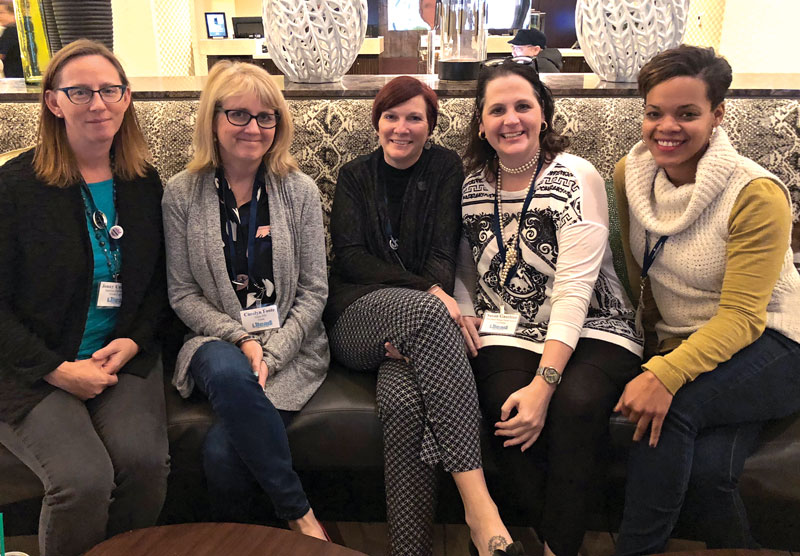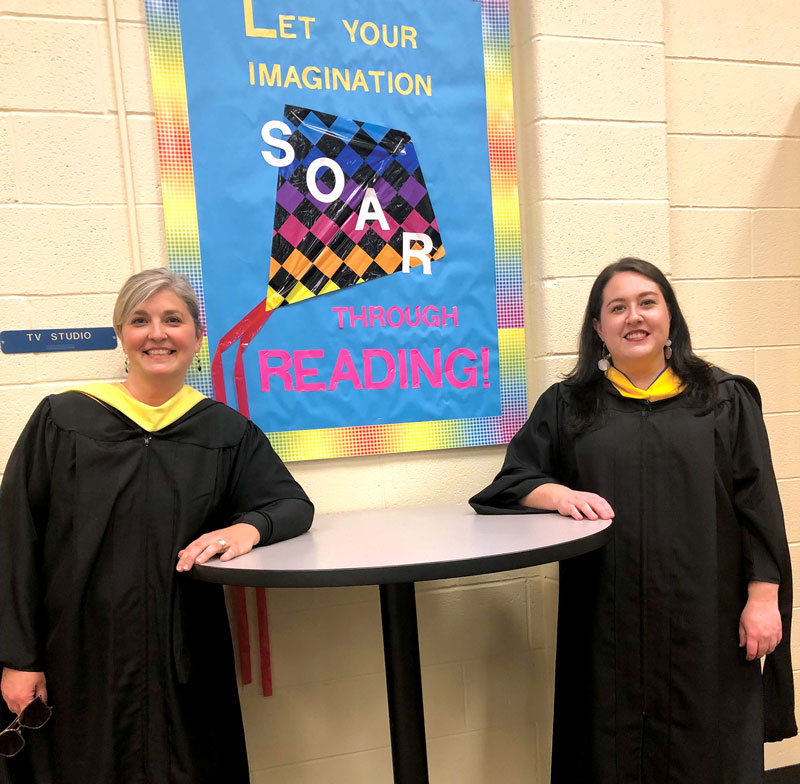Bolstering the MLS: What Librarians Need To Know About Certification, Badging, and Microcredentials
School librarians expand their skills with offerings from Google and Discovery Education to the Library of Congress. Here's what they have to say.

How do school librarians keep up in a fast-changing field? There’s an abundance of professional development (PD) opportunities available these days, including micro-credentials, badges and certifications, fellowship opportunities, and online courses offering credit. We talked to school librarians who’ve expanded their expertise with offerings from Google and Discovery Education to the Library of Congress. Here’s what they had to say.
Google it
Many educators swear by Google tools and certifications, including Colette Cassinelli. “I tell people all the time that yes, I have drunk the Google Kool-Aid,” says Cassinelli, library and IT teacher at Sunset High School in Beaverton, OR. “That’s because their products work, are reliable, help students collaborate, and continue to improve.”
Working in a district that has 1:1 technology with Chromebooks, Cassinelli pursued credentials as a Google for Education Certified Educator and Google Certified Innovator. She wanted to keep up-to-date with “everything to know about the GSuite environment,” she says. The professional network she built is still providing support “even 10 years later.”
Cassinelli was an early adopter, enrolling in the Certified Innovator program in its former iteration as Google Teacher Academy. “Google was one of the first online tools focused on collaboration, and it transformed the way I taught tech classes and later collaborated with my staff,” she says.
These certifications “establish my credibility as a person who provides PD at my school and community,” she says. For several years, she maintained a listing with Google Certified Trainers and provided PD to staff at other schools. Certified trainers are expected to host at least 12 trainings a year.
Christina Taylor, a librarian at Round Rock (TX) High School, came to Google’s Certified Trainer Program with “a healthy appreciation” for the company’s tools, thanks to her experience as a grad student who was working full-time. “I couldn’t engage much in student life or interact with my cohort,” she says. “Google apps facilitated asynchronous work that could be done on my schedule. I could still work collaboratively with classmates.” Also, “I was determined to teach students these tools to bolster productivity, skills, and creativity.”
While there are other similar tech certifications, Taylor says, “I adore that the Google for Education community encourages the use of free, web-based tools, not [proprietary] software.”
While Google doesn’t charge for its initial set of trainer classes, librarians should know that these courses alone don’t grant Certified Trainer status. After a student completes the courses, there’s a skills assessment test, costing $15. A student can then move on to Google Educator, Level One and Google Educator, Level Two exams, at $10 and $25, respectively. The results of these assessments, along with a three-minute trainer video created by the student to showcase their new skills and a list of at least five recent Google trainings, create an application portfolio to submit for Certified Trainer status. Taylor’s school budget paid for her training, and her principal has offered to cover the certification test fee for any faculty member.
 |
Lilead Fellows (l. to r.) Jenny Umbarger, Carolyn Foote, Jennifer Sturge, and Susan Gauthier with mentor Kafi KumasiPhoto courtesy of Jennifer Sturge |
Reaching goals with certification
When the American Association of School Librarians implemented new standards last year, Karen Callis, librarian and reading enrichment teacher at Chester County Middle School in Henderson, TN, needed help implementing Learning Standard II.D, in which “Learners demonstrate empathy and equity in knowledge building within the global learning community.” The National Geographic (NG) Certified Educator program helped “build my resources for encouraging global connectedness,” she says.
To earn certification, enrollees complete a capstone project. Callis presented her students with a fictitious opportunity to visit the Cape Verde archipelago off northwest Africa and challenged them to plot a travel route using maps from the library reference section or online. “They learned that students around the world care about the same issues. There’s power in our collective voices to change the world,” says Callis.
This free program is for educators serving pre-K–12. In addition to bringing new perspectives on global issues to her students, Callis uses a new learning framework to guide her teaching and a framework of perspectives for students. Other educators in the National Geographic Educator community share resources, ideas, and lesson plans, Callis adds.
Currently, Callis is planning a research project on elephant conservation. She also completed National Geographic’s Geo-Inquiry course and hopes that her work will highlight the value of school librarians, she says, “powerful agents of wonder, exploration, and worldwide change.”
Master classes
Thanks to an Urban Scholars Award through Harvard’s James Bryant Conant Fellowship, Liz Phipps-Soeiro earned a Master of Education in Specialized Studies, designing her own program. “I took courses at Harvard Law, the Kennedy School, as well as the School of Education,” she says. “I’m always thinking about the ecological model of education, which looks at all the communities a child is part of, and how these systems affect the child.”
Juggling her master’s workload, plus a teaching fellow post in the Harvard libraries, Phipps-Soeiro worked with the Cambridge Public Schools administration to move to a part-time librarian position during the one-year, high-intensity program.
Committed to “removing oppressive structures in order to benefit a child,” Phipps-Soeiro says her master’s gave her “the words and research to navigate those systems.” She’ll put her degree into action this fall. “There’s a push in Massachusetts for civics education to start in middle school. I want to see it begin as early as possible.” That includes, she adds, “teaching how to be an active member of your community, to make your voice heard.”
After learning about the Lilead Fellowship for school librarians in an SLJ article, Jennifer Sturge, district specialist for school libraries and digital learning with Calvert County (MD) Public Schools, applied for the 2017 cohort. Sturge saw Lilead as “a way to move forward in my profession and to become more of an advocate for the school librarians in my district.”
The 18-month program was “one of the most amazing things in my life!” She began thinking “in terms of systems leadership and systems change, moving away from the individual level.” Her fellowship project involved a data-based plan to move her school librarians to a more collaborative model of working with teachers. Sturge earned nine PD credits that went toward renewing her teaching certificate.
Make it work with micro-credentials
Micro-credentials, designed to highlight a specific skill, are appealing for busy librarians including Erika Long, with the Metro Nashville (TN) Public Schools. Long took advantage of her previous school district’s involvement with Digital Promise, a source of micro-credentialing for educators. “I completed the Substitution micro-credential,” she says, referring to Ruben Puentedura’s SAMR (Substitution, Augmentation, Modification, and Redefinition) model, which certifies her as “proficient in substituting technology for traditional methods for [school] assignments.” One lesson she taught to earn her badge showed students how they could use social media to showcase their reading in place of a paper reading log, including “blogs, Instagram, soundtracks, and writing reviews in our OPAC,” she says. Long, a “natural learner” drawn to PD opportunities, appreciated the self-paced format.
Sturge also received free micro-credentialing in Universal Design for Learning through her school system in an online 15-hour course with a final project. In July 2019, she attended the free Library of Congress Institute, which trains attendees on using the library’s primary source collections. She will bring that knowledge to her district, which is creating a new social studies curriculum.
 |
Denyse Phelps (left) with Krista Hartenbach, her co-librarian at James Wood High School in Virginia.Photo courtesy of Denyse Phelps |
Blending skills
For Denyse Phelps, librarian and department head at James Wood High School in Winchester, VA, certifications and PD are “[things] that I do for myself to build confidence, grow, and learn something to share with others.” Phelps has credentials in business, health, tech, and education, and will begin learning American Sign Language at nearby Lord Fairfax Community College (LFCC) this fall. It will help her work and “open more opportunities to make connections with my community and organizations,” she says.
Phelps is a STAR Discovery Educator, through Discovery Education, and recently earned a badge in Digital Citizenship from Commonsense Media. Both inform her work on a district-wide digital citizenship taskforce. Phelps has maintained full-time employment status while earning certifications. While she has spent her own money on much of it, her school pays for in-district PD and attendance at conferences.
She has also attended LFCC’s annual LearnerPalooza, where other educators share their expertise. Workshop topics include tech, best practices in teaching, and creating a strong personal learning network. “You are given a certificate to show your attendance,” she says. Plus, “this is a great place to collaborate and meet other educators.”
Teaching the teachers
Public librarians can play a role in amplifying the knowledge of their school library colleagues. Amy Mikel, a 2018 Library Journal Mover & Shaker, has run Brooklyn Public Library (BPL)’s Teacher Lab since 2014. While doing outreach in schools, Mikel discovered significant gaps in educators’ knowledge about library services. She launched an in-person training program in 2014 that “took attendees back to the basics of what a library and librarian can offer.” That ranged from how to sign up for a library card to using library and archive collections, plus traditional information literacy and tech skills connected to Google.
Mikel added an online, asynchronous Teacher Lab course in 2017. It drew more signups than all the previous years combined. While credentialing depends on the attendee’s home state, BPL is an approved continuing education provider for New York state and provides 12 hours of CE credit. Mikel doesn’t interact with attendees through most of the self-paced course, but “you can’t just phone it in,” she says. She looks for participation in discussion boards, and students submit a final assignment to receive their certificate.
Buyer beware
As librarians explore their continuing ed options, Cassinelli recommends taking a critical look at what is actually on offer and the impact of implementing in one’s school. “I am concerned that every other edtech company has their own ‘certified program,’ and the whole idea of free PD has turned into a corporate marketing scheme,” she says.
A “free” training may come with strings attached, she adds. “I worry that teachers are pressuring districts to purchase site licenses for programs where they received free PD. It makes me wonder if they went through a vetting process.” Privacy is also a concern. Cassinelli advocates careful consideration before a district adopts tech simply “because one or two influential educators went to a free training and are pushing it.”
However, well-chosen “professional development prepares us for what is ahead,” says Phelps. “Any time you can use your skills to teach others, learn about others, and share your knowledge, it is a win-win situation.”
April Witteveen is the community librarian at the Deschutes (OR) Public Library.
RELATED
The job outlook in 2030: Librarians will be in demand
The job outlook in 2030: Librarians will be in demand
ALREADY A SUBSCRIBER? LOG IN
We are currently offering this content for free. Sign up now to activate your personal profile, where you can save articles for future viewing






Add Comment :-
Be the first reader to comment.
Comment Policy:
Comment should not be empty !!!